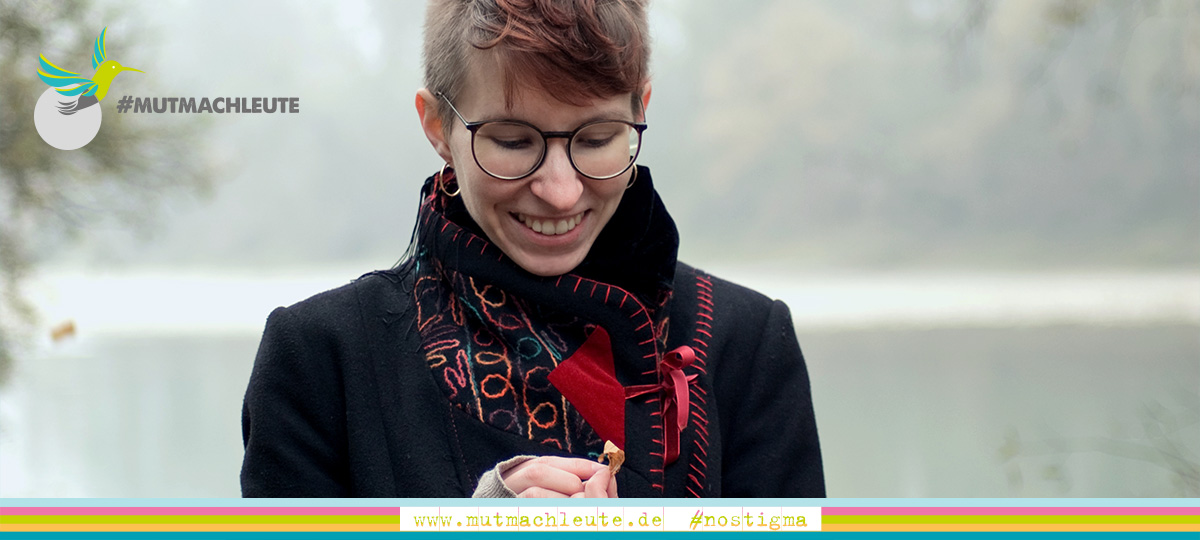Anxiety disorder and bipolar disorder: Born to be epic!
Affected: Azada
Vintage: 1991
Diagnosis: Bipolar II disorder with (ultra-)rapid-cycling, Generalized Anxiety Disorder, PTBS
Therapies: Cognitive behavioural therapy, drug therapy
Resources: nature, photography, writing on my book, painting/drawing, my partner, music, reading
How and when did you learn of your illness?
In December 2019, I experienced the final collapse in the form of severe depression. In January, I introduced myself to a therapist. In the course of the first sessions, the main diagnosis of bipolar disorder (type 2) was clear. It has to be said that I had suspected in my youth that something was wrong with me. After my High School graduation, I began to investigate, even though I basically question Dr. Google. However, I was already familiar with the concept of mania and so I quickly ended up with bipolarity. I read everything about it and had the feeling of being understood only in the descriptions of the symptoms. At some point I told my parents about it. And my circle of friends. But that was too much for my environment. No one really knew what to say to her or him.
My depressive episodes got worse, but at the same time the hypomanias. But since I am extremely perfectionist, I have compensated for everything over the years. I knew a high would be followed by a low – and at least that’s what I was preparing for.
I always worked. And my health suffered enormously. After 12 years, it didn’t work anymore. And now I can be sure that my guess was always correct.
Why did you decide to show your face now?
Because mental illness should not be a taboo subject. And because I like to talk about my experiences. Maybe it helps somebody. That is enough.
How did your environment react when it learned of your illness, and how would you want your environment (and society) to deal with your illness?
The reactions from my circle were very different. My partner is the most understanding person I know and had no problems at all with the fact that I suffer from a mental illness.
My father didn’t want to see it at the beginning. It wasn’t until he saw me in my severely depressed episode that he couldn’t talk to him. In the meantime, there is a great deal of understanding and acceptance, also for behaviours such as.B. social withdrawal, etc. My best friend has a great empathy and after the first shock moment she showed that too.
The rest of the environment … Difficult. You can see how few people believe in diseases that you can’t see.
I want “we” to be heard, seen and accepted.
What things helped you most to accept the disease?
I never had a problem accepting the diagnosis. Accepting the symptoms is not always easy. But I wouldn’t want to be another person.
What resources do you use in crisis situations?
In my most difficult time, long walks in nature (often with camera) were the only thing that gave me support besides the conversations with my partner.
It is always difficult to see that hypomania can also become a crisis situation. Presumably it would help me to read a lot. Sport, speech. But often I get extremely creative and I can’t keep up.
What do you want to give to other people affected?
The power … strong in us. 😉
What do you want to give other relatives along the way? How can they best help you (on the one hand) and yourself (on the other hand)?
I can only speak from my point of view. Good communication on both sides helps me in the first place. And I guess the other way around is the same. Sometimes inquiries are useful, but all with caution and empathy. Otherwise offer help, but also know your own limits. Perhaps the person/persons will accompany them to the therapy once if they agree to it. It is also good to find out about the disease, but it is important to remember that a diagnosis is only a kind of ‘directive’. Symptomaticism is then again very individual.
The most important thing for me: to show that the person/persons are loved and give her/him the feeling that she/he is not a burden. This does not mean that the situation cannot be onerous. But the person itself is certainly not always only in the “taker position” and this should also be made clear. As a person affected, I want to feel needed.
What makes your character and what trait do you value most about yourself?
I’m creative. Perfectionist. Contradictory. I feel as if I have a thousand different souls in me, because I can feel and perceive in such a different way. That’s what I like about myself. And it eats me up.
I am full of self-doubt. I know I have a lot of talent. I am proud of that. I feel the feelings of others, in addition to mine, and Am overwhelmed by it day after day. I am helpful, cynical, have a solution for everything, believe in the worst-case and am absolutely enthusiastic, feel like a child. A thousand interests. Confident. Passionate. Melancholic.
I appreciate my versatility.
Azada is on Twitter.



